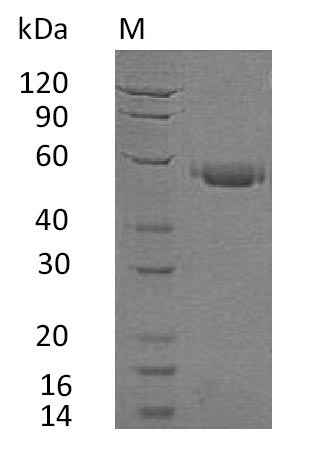CD40 (human):Fc (human) (rec.)
CHI-HF-210CD40
Product group Proteins / Signaling Molecules
Overview
- SupplierChimerigen Laboratories
- Product NameCD40 (human):Fc (human) (rec.)
- Delivery Days Customer2
- CertificationResearch Use Only
- Estimated Purity>98%
- Scientific DescriptionCD40 [TNFRSF5] is a member of the TNF receptor superfamily which are single transmembrane-spanning glycoproteins and plays an essential role in mediating a broad variety of immune and inflammatory responses including T cell-dependent immunoglobulin class switching, memory B cell development, and germinal center formation. CD40 contains 4 cysteine-rich repeats in the extracellular domain and is expressed in B cells, dendritic cells, macrophages, endothelial cells and several tumor cell lines. The cognate interaction between CD40 and CD40 ligand (CD154) on T cells activates NF-kappaB, Jun N-terminal kinase and Janus kinase signal transducers and activators of transcription pathways. Several different TRAF proteins (adapter proteins) have been identified to serve as mediators of the signal transduction. In addition, CD40/CD40L interaction is found to be necessary for amyloid-beta-induced microglial activation and thus is thought to be an early event in Alzheimer disease pathogenesis. Defects in CD40 result in hyper-IgM immunodeficiency type 3 (HIGM3), an autosomal recessive disorder characterized by the inability of B cells to undergo isotype switching, as well as an inability to mount an antibody-specific immune response and a lack of germinal center formation. - Protein. The extracellular domain of human CD40 (aa 21-193) is fused to the N-terminus of the Fc region of human IgG1. Source: CHO cells. Endotoxin content: 98% (SDS-PAGE). CD40 is a member of the TNF receptor superfamily which are single transmembrane-spanning glycoproteins and plays an essential role in mediating a broad variety of immune and inflammatory responses including T cell-dependent immunoglobulin class switching, memory B cell development, and germinal center formation. CD40 contains 4 cysteine-rich repeats in the extracellular domain and is expressed in B cells, dendritic cells, macrophages, endothelial cells and several tumor cell lines. The cognate interaction between CD40 and CD40 ligand (CD154) on T cells activates NF-kappaB, Jun N-terminal kinase and Janus kinase signal transducers and activators of transcription pathways. Several different TRAF proteins (adapter proteins) have been identified to serve as mediators of the signal transduction. In addition, CD40/CD40L interaction is found to be necessary for amyloid-beta-induced microglial activation and thus is thought to be an early event in Alzheimer disease pathogenesis. Defects in CD40 result in hyper-IgM immunodeficiency type 3 (HIGM3), an autosomal recessive disorder characterized by the inability of B cells to undergo isotype switching, as well as an inability to mount an antibody-specific immune response and a lack of germinal center formation.
- Storage Instruction-20°C,2°C to 8°C
- UNSPSC41116100
- SpeciesHuman




